‘Potential risks’: Concerns as Chinese EVs flood Australia
Australia’s EV market is surging again as a new rival to Tesla takes off — but the boom has sparked fresh warnings for motorists.
On the Road
Don't miss out on the headlines from On the Road. Followed categories will be added to My News.
Australia’s electric vehicle market is surging again as a new rival to Tesla takes off, but the boom has sparked fresh warnings for motorists.
Chinese giant BYD, which overtook Tesla as the world’s number one EV maker in January, just posted a new record for monthly sales in Australia even as Elon Musk’s company is forced to slash prices.
With more affordable options than Tesla — the BYD Atto 3 starts from $44,499, versus the now discounted $54,900 starting price for the base Tesla Model 3, which still costs up to $80,900 for the Performance variant — BYD has quickly emerged as a popular alternative for eco-conscious Aussies on a budget.
BYD sold more than 1900 cars in May, well above its previous record of 1622.
Overall monthly sales of battery EVs saw a slight increase, accounting for 8.1 per cent of new cars sold, up from 7.7 per cent in May 2023, according to the Federal Chamber of Automotive Industries (FCAI).
EV sales in Australia have grown from about 1900 per month in 2022 to 8000 per month this year.
Tesla is still the most popular EV in Australia, making up more than half of sales last year, but BYD is quickly closing in — in large part thanks to generous subsidies from the Chinese government driving its prices down.
“We’re certainly seeing increased activity across our business, our websites are recording really strong inquiry, as are our dealers,” David Smitherman, chief executive of Australian BYD importer EVDirect, told News Corp Australia earlier this month.
“I think it’s certainly getting very competitive out there, that’s for sure, with a lot more product being offered.”
But the flood of Chinese-made EVs — more than 80 per cent of EVs sold in Australia, including Tesla, are manufactured in China — has raised concerns among some experts.
Those range from issues around safety, servicing delays and data privacy, to the broader geopolitical implications.
“If you rely on one geographic concentrated area for big major products like EVs, that is always very risky in terms of supply chains, in terms of the production capabilities,” Marina Zhang from the Australia China Research Institute told the ABC last week.
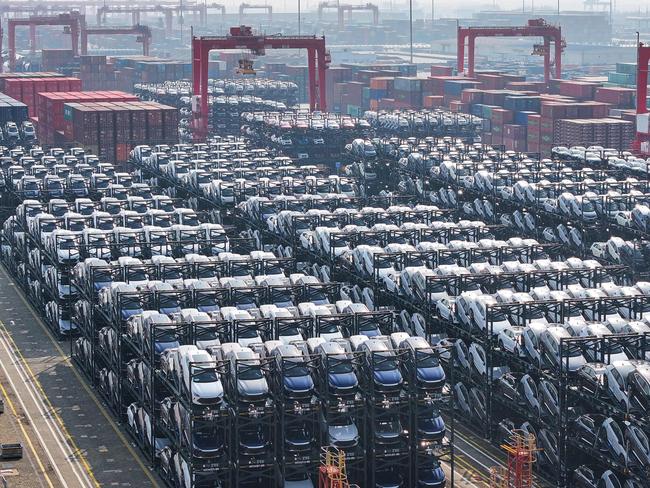
“Any supply chains are subject to external shocks, let’s not forget about Covid in 2020, the whole world was struggling with breakdowns of supply chains for some essential suppliers, so that is always a danger.”
Canberra resident Dr Awadhesh Prasad, who purchased a BYD after doing months of research and concluding Tesla was “overly priced”, told the broadcaster those concerns were realised when an early issue with the car took a month to fix.
“[My wife’s] concerns were related to the brand reputation of BYD because, compared to Tesla, BYD has been in the market only a couple of years,” Dr Prasad said.
“And the other reason was that if something goes wrong with the car, it will not be very easy to fix quickly and unfortunately that concern came largely true.”
BYD’s early rollout in Australia was also marred by several compliance breaches, but the Australasian New Car Assessment Program (ANCAP) has since awarded each of its available models a five-star safety rating.
While the popularity of Chinese EVs will come as welcome news to the Albanese government seeking to boost uptake to meet its climate change targets, other countries less friendly to China are rapidly putting up barriers to what they view as more of an economic weapon than a genuine export.
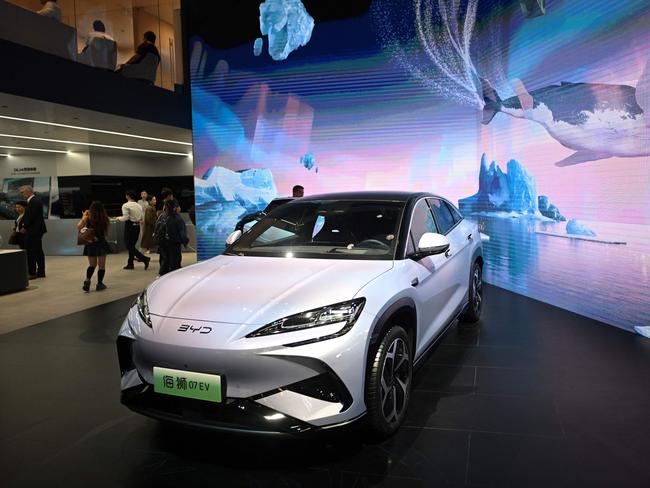
Last week the European Union warned it would slap tariffs of up to 38 per cent on Chinese EV imports after an anti-subsidy probe, while the US in May said it would tariff the cars at 100 per cent, accusing China of “flooding global markets with artificially low-priced exports”.
Faced with an imploding domestic real estate bubble, the Chinese Communist Party has sought to revive its ailing economy by doubling down on exports such as EVs, machinery and consumer electronics, propped up by cheap, state-directed loans.
“Beijing is seeking to engineer an economic turnaround by ploughing money into factories, especially for semiconductors, aerospace, cars and renewable-energy equipment, and selling the resulting surplus abroad,” The Wall Street Journal reported in March.
“Unlike in the early 2000s, however, the Western world now sees China as its chief economic rival and geopolitical adversary.”
Strategic Analysis Australia founder and director Michael Shoebridge previously told news.com.au it was clear “China is capturing new global markets and it is owning the supply chains for those markets”.
“Dual circulation is Xi Jinping’s signature economic strategy and it is to do two things — make China less dependent on other economies, and make other economies more dependent on China,” he said. “That is the lens to view this through.”
Mr Shoebridge said EVs were the most obvious example.
“With the current policy settings across the world from Europe to Australia, BYD’s dominance looks assured because they will use their huge excess capacity and protected market position to crush all other rivals by pricing them out,” he said.
“Deflation in China and low growth makes their prices more compelling and means they must export to stay in business.”
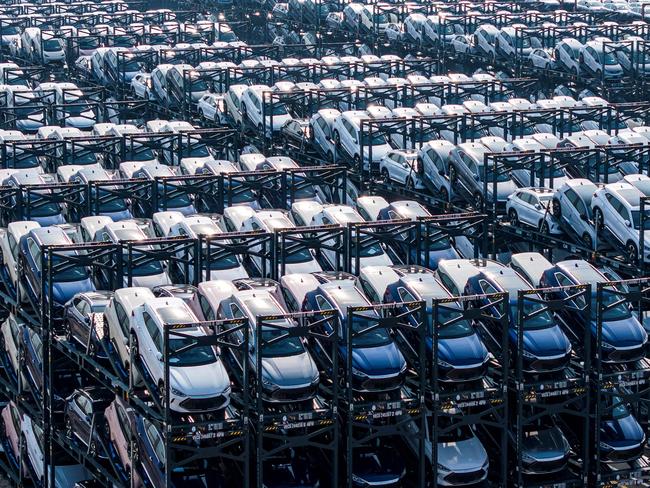
Mr Shoebridge said Australia “has this real problem that we’re stuck pretending that the pre-pandemic, globalised economy still exists and that it’s just about us producing stuff at a compelling price and getting it bought” — but the rest of the world had begun returning to “nationalistic” policies in the face of China’s “deeply mercantilist” behaviour.
“The pandemic started to break globalisation and geo-strategic competition has further fragmented it, [but] our core policy settings [haven’t changed],” he said.
Moreover, the cars themselves may pose a security risk, some experts have claimed.
Last year, the hawkish Australian Strategic Policy Institute (ASPI) think tank sounded a warning about China’s rapid rise in the Australian EV market.
“As cars have become more technologically advanced, they have turned into what are essentially rolling computers,” wrote former editor of ASPI’s The Strategist Jack Norton.
“Modern cars are swathed in cameras and sensors and increasingly connected to the internet for ‘over the air’ tasks like updating software. They collect data ranging from location and routes driven to phone contacts and calls made by drivers. Such data could be used to put together a comprehensive picture of a person’s activities, and, if a car’s owner drives to work at a secure facility, for example, potentially pose a risk to national security.”
Norton warned this “data-heavy trend is only accelerating with the rapid uptake of EVs and development of self- and assisted-driving technology”.
“As with any internet-connected devices, cars should come under scrutiny for the security of their systems — and arguably more strict examination since there are literally lives at stake when it comes to the fallibility of self-driving technology,” he said.
“Reports that ‘tracking devices’ containing SIM cards were found in sealed components in UK government vehicles have highlighted concerns about the prevalence of Chinese-made parts in the wider automotive industry … China is already a leader in many of the technologies that will be vital to the future of transportation, including electric batteries and the analytics and artificial intelligence required to process the huge amounts of data vehicles collect and, in time, integrate them into so-called smart cities.”
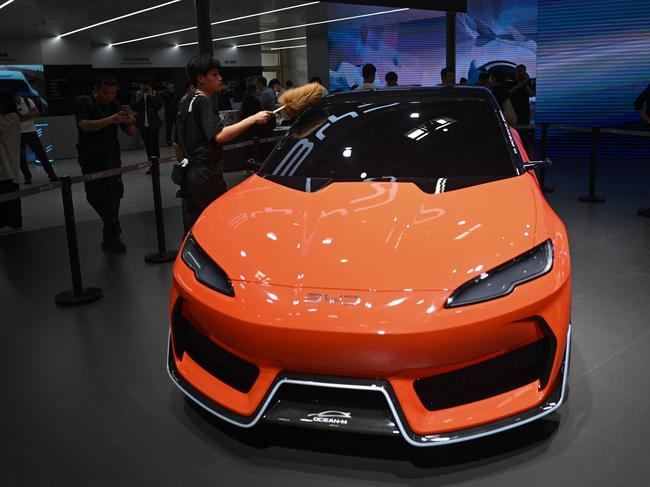
He urged consumers to “be aware of the potential risks to themselves, their families and their data, and consider whether a vehicle that’s made in China, regardless of the manufacturer, is something they are willing to lay down their hard-earned cash for”.
But Swinburne University professor of future urban mobility Hussein Dia said China’s dominance of the Australian EV market was a “good thing for consumers and the planet”, despite continuing concerns over quality and overseas reliance.
“This is a result of a targeted strategy that built on their strength in advanced battery technologies over the past two decades and their partnerships with leading car manufacturers since 2017,” Prof Dia said in a statement.
“Cheaper EVs are good news for consumers in Australia, particularly in the small to medium car market segment where the available EV choices are still limited. Providing these options to consumers means improving our chances to achieve the mandated emissions reductions targets, and consumers also benefit as result of reduced running costs because EVs are cheaper to run.”
Meanwhile, Wednesday’s announcement by the EU of fresh tariffs on Chinese EVs risks provoking a bitter trade war.
Brussels angered Beijing by launching the investigation last year in a bid to defend European manufacturers in the face of a surge of cheaper Chinese imports.
The Chinese Commerce Ministry slammed the decision as “naked protectionist behaviour”, in an angry statement after the announcement.
There is also dissent within the EU with Germany, a major trade partner to China, saying the tariffs would harm German companies.
The European Commission has proposed a provisional hike of tariffs on Chinese manufacturers — 17.4 per cent for market leader BYD, 20 per cent for Geely and 38.1 per cent for SAIC.
The EU said the amount depended on the level of state subsidies received by the firms.
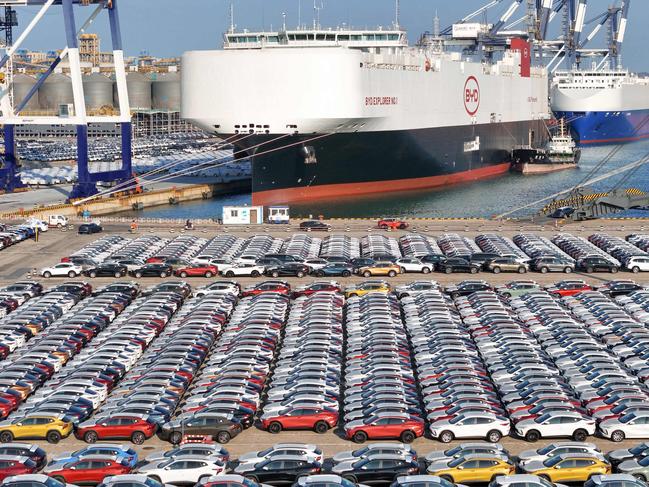
Electric car producers in China that co-operated with the EU will face a tariff of 21 per cent, while those that did not co-operate would be subject to a 38.1 per cent duty.
This would be on top of the current import duty of 10 per cent. The commission pointed to “unfair subsidisation” in China, which it said “is causing a threat of economic injury” to EU electric car makers.
A Chinese Commerce Ministry spokesperson said the EU’s decision risked “creating and escalating trade friction”.
“China will take all necessary measures to firmly safeguard its legitimate rights and interests,” Foreign Ministry spokesman Lin Jian warned.
To halt the extra tariffs being levied, Beijing and Brussels must resolve the subsidies issue.
“The Commission went out of its way to show there is space for negotiation,” said Francesca Ghiretti, a fellow on economic security at Washington-based think tank CSIS.
But Ms Ghiretti told AFP it was not exactly clear what China could offer “that would actually mitigate the existing concerns”.
The tariffs will apply provisionally from July 4 and then definitively from November unless there is a qualified majority of EU states — 15 countries representing at least 65 per cent of the bloc’s population — voting against the move.
Chinese media ramped up threats that Beijing could target EU exports, including pork and dairy products, ahead of Wednesday’s decision.
In January, China launched an anti-dumping investigation into brandy imported from EU, in a move seen as targeting France, which pushed for the commission’s probe.
A group representing French cognac producers said it was “deeply concerned” about possible Chinese retaliation.
Despite the fears, Ms Ghiretti said “an escalatory trade war” between the EU and China was not “surely on the table” and could be avoided.
China is the world’s biggest car exporter and Europe is a critical market for it.
EU imports of EVs from China mushroomed from around 57,000 in 2020 to around 437,000 in 2023, the US-based Peterson Institute for International Economics said.
Germany’s Kiel Institute for the World Economy said a 20 per cent tariff would mean 125,000 fewer Chinese electric cars to the EU, worth almost $US4 billion ($6 billion).
— with AFP
Originally published as ‘Potential risks’: Concerns as Chinese EVs flood Australia





